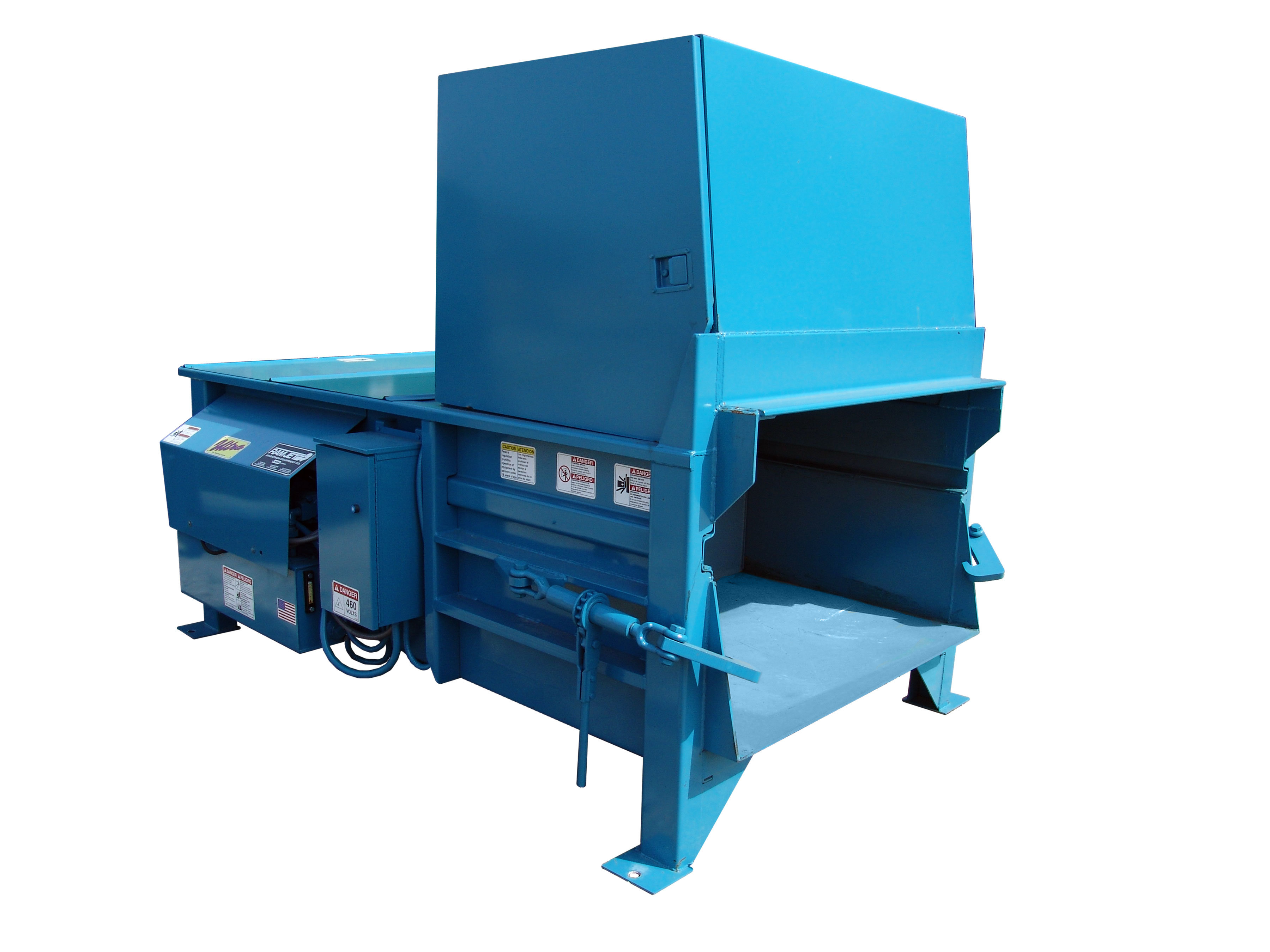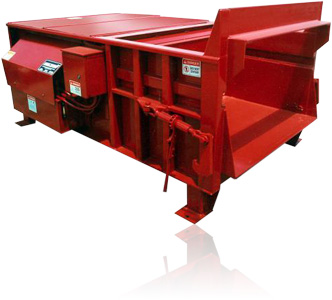Commercial trash compaction equipment and its role in minimizing waste volume
The Duty of Waste Equipment in Encouraging Sustainable Garbage Disposal Practices
Waste Equipment serves a fundamental duty in progressing lasting waste disposal practices. It incorporates a variety of tools created to improve the efficiency of waste partition, processing, and collection. By utilizing Equipment such as compactors, shredders, and reusing bins, areas can substantially minimize their dependence on landfills. Nonetheless, the effect of these devices extends beyond functionality. Recognizing their broader effects exposes insights into how they shape ecological obligation and community interaction. What exists ahead in this evolving landscape?
Comprehending Waste Equipment and Its Importance
Waste Equipment plays a crucial role in effective waste administration systems. It encompasses a variety of devices and machinery made to deal with, procedure, and get rid of waste products efficiently. Comprehending waste Equipment is essential for districts, businesses, and organizations aiming to apply sustainable waste disposal methods - Commercial garbage compaction equipment. Correctly working waste Equipment not just enhances the collection and transportation of waste yet likewise decreases environmental impact by guaranteeing that waste is handled properly
The significance of waste Equipment prolongs to improving reusing initiatives, lowering land fill use, and advertising source healing. Equipment such as compactors, balers, and shredders help with the processing of waste, making it easier to divide recyclable products from basic refuse. Furthermore, improvements in waste innovation contribute to the development of even more eco-friendly services, thus strengthening the dedication to sustainability. Overall, waste Equipment acts as a foundation for reliable waste monitoring, fostering a cleaner and much healthier environment for future generations.
Sorts Of Waste Equipment for Effective Waste Administration
Efficient waste management relies upon numerous kinds of Equipment designed to attend to particular disposal demands. Among these, compactors play an important duty by decreasing the quantity of waste, making transportation a lot more reliable. Shredders are essential for damaging down big items, promoting much easier handling and disposal. Additionally, balers press recyclable materials right into manageable bundles, optimizing storage and transportation.
Containers and bins are basic for collecting waste at the resource, guaranteeing proper partition and reducing contamination. For unsafe materials, specific Equipment, such as drum crushers and watertight containers, is necessary to ensure safety and security and conformity with policies.
Lastly, transportation cars furnished with hydraulic systems boost the efficiency of waste collection and disposal procedures. Each kind of waste Equipment adds to a streamlined waste administration system, promoting sustainability and minimizing environmental influence via effective disposal practices.
The Function of Recycling Containers in Sustainable Practices
Recycling bins play a vital duty in promoting sustainable practices by assisting in reliable waste splitting up. By providing designated containers for recyclable products, they encourage individuals to adopt green behaviors. This simple implementation significantly contributes to reducing landfill waste and improving recycling rates.
Efficient Waste Separation
Proper waste splitting up plays an essential duty in advertising lasting methods, and reusing bins serve as a considerable tool in this process. By plainly comparing recyclables, compostables, and general waste, these bins facilitate effective sorting, decreasing contamination and making best use of reusing performance. Their strategic placement in public and private rooms motivates individuals to participate in accountable waste disposal. The use of color-coded bins assists to simplify the splitting up process, making it intuitive for customers. This organizational method not just enhances reusing prices but additionally increases recognition regarding the importance of waste monitoring. Basically, recycling containers are essential components that sustain effective waste splitting up, eventually adding to a much more lasting setting and reducing the general strain on land fills.
Motivating Eco-Friendly Actions
Although people might be inclined to ignore their effect on the atmosphere, the visibility of recycling containers substantially influences environment-friendly actions. These containers serve as visual suggestions, encouraging people to different recyclables from basic waste. Their tactical positioning in public rooms advertises ease of access, making it easier for individuals to embrace lasting techniques. Studies suggest that when reusing containers are readily available, recycling rates boost substantially, reflecting a direct connection in between framework and actions. Furthermore, colorful signage on these bins informs customers concerning what products can be reused, lowering contamination prices. By fostering a culture of recycling, these bins not only help with appropriate waste administration however likewise inspire a collective responsibility toward environmental stewardship, eventually contributing to a much more sustainable future.
Composting Solutions: Turning Waste Into Resources
Composting systems act as a vital device in changing natural waste right into valuable resources, providing many ecological benefits. Various kinds of composting Equipment satisfy different needs, making the procedure obtainable to both people and neighborhoods. Understanding the composting procedure is crucial for optimizing its efficiency and promoting lasting waste management techniques.
Advantages of Composting Solutions
Lots of neighborhoods are progressively recognizing the countless advantages of composting systems, which transform natural waste right into beneficial resources. These systems successfully minimize landfill waste, therefore lowering greenhouse gas discharges and conserving natural deposits. By converting food scraps, yard waste, and other natural materials right into nutrient-rich compost, they boost soil health and fertility, advertising sustainable agriculture techniques. Composting aids to keep moisture in the soil, lowering the requirement for chemical plant foods and watering. It promotes biodiversity by giving a habitat for valuable microbes and insects. In addition, composting educates people about environmental stewardship, urging a society of sustainability. In general, composting systems play an important duty in creating a round economy, where waste is lessened, and sources are reused.
Types of Composting Equipment
A selection of composting Equipment is available to help with the efficient handling of natural waste into beneficial compost. These systems range from basic yard compost bins to sophisticated industrial composters. For home usage, stemless glass and static bins are prominent, permitting for manageable aeration and mixing. Aerated fixed stacks use blowers to boost air movement, greatly accelerating decay. Large procedures might use in-vessel composters, which control temperature level and humidity for perfect composting conditions. Worm composters, or vermicomposting systems, harness the natural digestive processes of worms to break down raw material. Furthermore, chippers and shredders help prepare products by reducing size, promoting faster break down. Each sort of Equipment serves particular needs, enabling diverse composting methods that add to lasting waste administration.
Composting Process Explained
The composting process changes natural waste right into nutrient-rich sources with a collection of biological and chemical responses. Microorganisms such as microorganisms and fungis break down natural materials, including food scraps and yard waste. This disintegration creates warm, promoting additional microbial activity and accelerating the failure procedure. As the compost matures, the temperature level reduces, permitting valuable microorganisms to prosper. The presence of oxygen is essential, advertising cardiovascular problems that boost microbial effectiveness. Throughout this process, carbon-to-nitrogen ratios must be kept to optimize disintegration. Completion result is humus, a dark, crunchy substance abundant in nutrients, which can be used to enhance dirt, support plant development, and add to sustainable farming practices.
Cutting-edge Technologies in Waste Collection and Disposal
As cities come to grips with increasing waste quantities and environmental problems, cutting-edge technologies in waste collection and disposal become necessary solutions. Smart waste containers equipped with sensing units track fill levels, enhancing collection routes and minimizing fuel usage. These containers can also interact with waste management systems, decreasing and helping with prompt pick-ups overflow issues. In addition, independent vehicles, including drones and robot systems, are being released to enhance operational performance in waste collection.
Advancements in sorting innovations, such as fabricated intelligence and machine discovering, make it possible for more efficient recycling processes by rapidly determining and separating materials. Additionally, waste-to-energy innovations transform natural waste right into eco-friendly power, reducing landfill reliance and adding to energy sustainability. These developments not only simplify waste administration practices but also promote a circular economy, thus promoting a sustainable approach to squander disposal. Ultimately, the combination of these technologies plays a pivotal role in dealing with urban waste challenges and enhancing environmental stewardship.
Area Involvement Via Waste Equipment
While efficient waste management counts heavily on sophisticated innovations, community engagement through waste Equipment plays an essential function in cultivating sustainable methods (Commercial garbage compaction equipment). Waste Equipment, such as reusing containers and composting terminals, offers not only as functional devices yet additionally view it as stimulants for neighborhood understanding and participation. By positioning these resources in available areas, communities encourage people to take an active role in waste decrease and recycling initiatives
Educational campaigns accompanying waste Equipment installations can additionally enhance community participation, leading citizens on proper disposal approaches and the benefits of lasting techniques. Furthermore, neighborhood events that utilize waste Equipment, such as clean-up drives and recycling obstacles, inspire collective activity and build a feeling of duty among neighborhood participants.

The Future of Waste Administration and Sustainable Solutions
Advancements in innovation and shifts in societal perspectives are shaping the future of waste management and lasting options. Smart waste management systems, making use of IoT gadgets, are enabling real-time surveillance of waste levels, enhancing collection routes, and minimizing carbon footprints. These advancements not just enhance performance but additionally promote reusing and composting efforts by offering data-driven insights.
The increase of round economic climate techniques motivates companies to reassess product style, focusing on reusability and recyclability. This shift promotes a society of sustainability, where consumers are significantly demanding environment-friendly products.
Neighborhood participation in waste management is ending up being increasingly necessary, with educational programs equipping people to take obligation for their waste. As federal governments worldwide implement stricter guidelines on waste disposal, communities and services are motivated to take on lasting techniques. With each other, these elements lead the way for a future where waste is lessened, and resources are saved, making certain a healthier world.
Regularly Asked Questions

How Can Services Benefit Monetarily From Investing in Waste Equipment?
Purchasing waste Equipment can bring about considerable economic benefits for organizations. By enhancing performance, minimizing disposal prices, and enhancing reusing capabilities, firms can lower operational expenditures and potentially create income via recovered products.
What Regulations Govern using Waste Equipment in Various Regions?
Numerous regulations regulate waste Equipment use, differing by region. These consist of ecological requirements, safety procedures, and functional standards, focused on guaranteeing conformity, advertising public health, and reducing ecological influence associated with waste administration practices.
Exactly how Do I Choose the Right Waste Equipment for My Requirements?
Picking the appropriate pop over to this web-site waste Equipment requires reviewing specific waste types, quantity, and disposal methods. Looking into available choices, talking to professionals, and taking into consideration governing conformity will certainly assist in making an informed decision tailored to private demands.
What Are the Ecological Influences of Ineffective Waste Equipment?
Ineffective waste Equipment can lead to enhanced discharges, greater power intake, and higher land fill overflow. It often leads to inappropriate waste segregation, aggravating pollution and adversely influencing ecosystems, which ultimately hinders lasting waste monitoring initiatives.
Exactly How Can Waste Equipment Be Kept for Optimum Performance?
Waste Equipment can be maintained for peak performance through regular evaluations, timely fixings, correct cleansing, and adherence to producer guidelines. This assures effectiveness, prolongs Equipment life expectancy, and reduces ecological influence during waste management procedures.
Waste Equipment plays an essential role in reliable waste monitoring systems. Recognizing waste Equipment is crucial for services, organizations, and municipalities intending to carry out sustainable waste disposal techniques. While reliable waste administration relies greatly on sophisticated innovations, community involvement through waste Equipment plays an essential duty in promoting sustainable methods. Community involvement in waste monitoring is becoming progressively essential, with academic programs encouraging individuals to take responsibility for their waste. Choosing Read More Here the ideal waste Equipment requires reviewing particular waste types, quantity, and disposal methods.